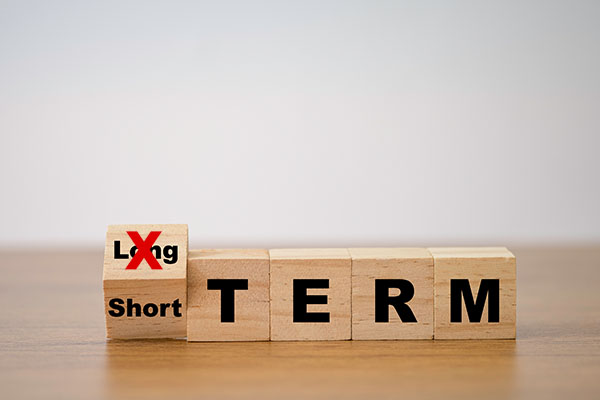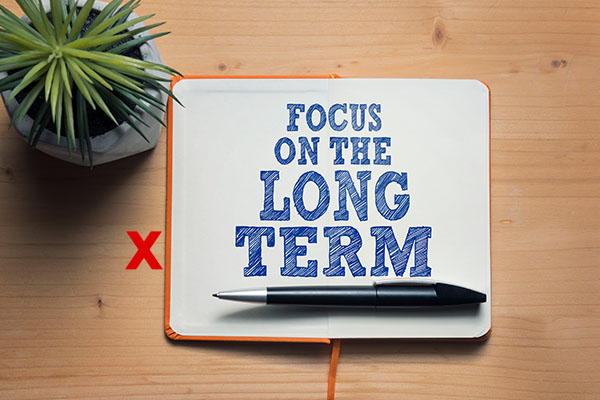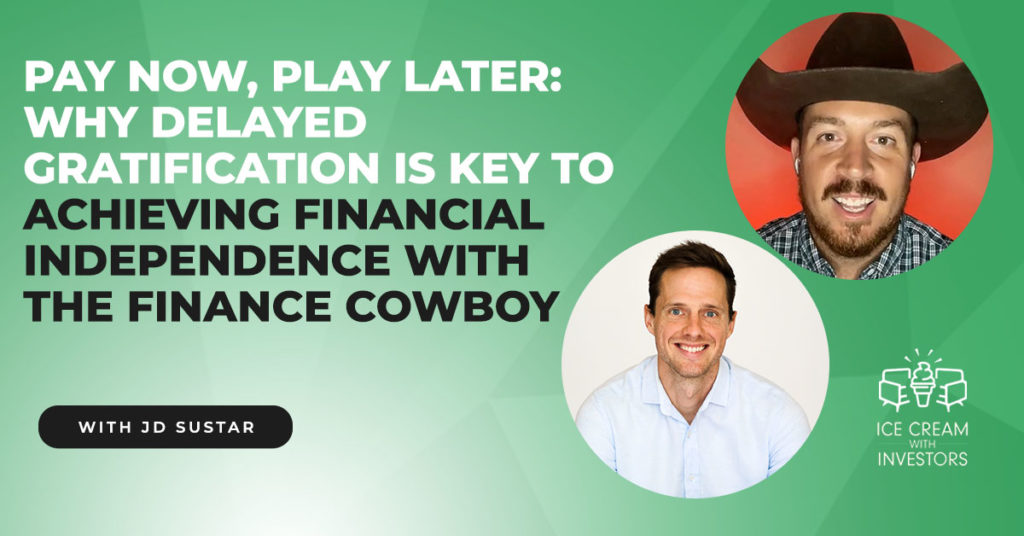Don’t lose hope because financial independence is very much attainable if you have the proper discipline. Let’s dive deep into this episode as Finance Cowboy JD Sustar discusses what it really means to pay now and then play later. He explains why delayed gratification is the key to achieving the success you have always dreamed of. He also shares how you can recognize investing opportunities in the real estate industry and make the most out of them. If you know how to control yourself, you are headed to a brighter path.
—
Watch the episode here
Listen to the podcast here
Pay Now, Play Later: Why Delayed Gratification Is Key To Achieving Financial Independence With The Finance Cowboy JD Sustar
In this episode, we have JD Sustar. You might also know him as The Finance Cowboy on all social media channels. In the span of three years, JD has already amassed 22 rental properties. He also helps teach thousands of people every day how to invest in real estate and what steps they need to take to get their personal finances in order. JD and I share a lot of commonalities in our backgrounds. I’m super excited to have him on the show. JD, welcome to the show.
Thanks for having me. I’m excited to be here.
You know we like to start with difficult questions. What’s your favorite ice cream?
Chocolate, no doubt.
You were the first person that has said pure chocolate. We got a lot of vanilla, but not chocolate.
There’s no other ice cream. Chocolate is it.
Do you throw any toppings on the chocolate? Any sprinkles or sauces?
No. If I was going to do anything, we can mix it with some peanut butter but still, the pure chocolate is golden.
You had me at peanut butter and chocolate. I think peanut butter is good on any ice cream. Tell our readers, what’s the scoop? What do you do now?
I’m a W-2 employee at a medical device company. I’m in sales. I thoroughly enjoy that. I started making a high income through that. I decided, “I have to deploy this capital somewhere. I don’t want to waste it. I don’t want to spend it. I know I want to build wealth to eventually get to financial freedom.” After exploring different avenues, real estate by far seemed like the way to go. I started buying real estate in 2018. I have 21 properties. I went down and sold one. I got a lot of questions from friends, from people in my network asking me like, “How are you doing this? How are you buying real estate? What’s the deal?”
I ended up starting what’s called Finance Cowboy. It started on Instagram. I call it my second personality or my online personality. It’s like that Brad Paisley song, everybody’s so much cooler online. That’s me. I started that back in July of 2021 and people liked my content and it has grown. I have over 30,000 followers and I put out tips daily on how to buy properties, how to analyze properties, or what you’re looking for in deals. I am close to completing a course/mentorship where people can come on board, take the course, and then get mentored weekly by myself and my team on how to buy those properties, whether you’re just starting out or you’re scaling. We got a lot going on and I’m super excited.
We’ll dig into the course towards the end of the show because I know you’re good about creative financing and finding creative deals. Before we get there, you mentioned that you always knew that you wanted to park your capital in real estate. I got to ask, what caused that? Usually, there’s some event or mentor or book that leads people down this route. What led you to believe that that was the best route to go?
I grew up in a pastor’s home. I’m sitting in my dad’s office at his church right now. I didn’t grow up around money. We didn’t have a lot of money. We didn’t have assets. There was no financial freedom talk. I didn’t get inundated with it until I met my wife. Me and my father-in-law, her dad had become very close over the years. He’s my inspiration for real estate because I look at what he had done. He had done well in his job with his company, building a company from the ground up. He decided to deploy his capital in real estate. He’s got a lot of properties, waterfront, land and commercial buildings. I saw what it did for him over time.

Financial Independence: You should look for cashflow in properties. But there’s something to be said for appreciation mixed with tenant debt buydown.
It literally gave him the freedom to be able to do whatever he wanted to do. I was still young when I’m learning all this. I didn’t go straight into, “I can’t wait to just dive into real estate mode.” You stick that in the back of your mind and you’re like, “That seems like a good idea.” Still, even then, there’s a lot of fear that comes with real estate. It’s scary to take that jump. I remember I was in pharmaceuticals and I switched from there to the med device. I’m doing pretty well with money and income. My best friend had started in real estate right out of college. He had started buying rental properties, getting in on deals and syndicating on deals.
He kept telling me, “You have got to start buying real estate.” I was seeing what it was doing for him even in his short amount of time of buying, and the wealth that he was creating. The fear was holding me back. For all you newbies on here, I remember to this day what that feels like. You don’t know what’s on the other side. You’re scared to take the plunge because you think of everything bad that’s going to happen. He brought me a property in Greenville, South Carolina right down the road from me. He said, “You’re buying this.” He didn’t give me an option. He’s like, “No more fiddle-farting around. You’re buying this property.”
I took the plunge. I bought it and it’s interesting because as soon as I close, that fear of the unknown like, “I’m not supposed to do this. This isn’t for me. Am I even allowed to do this? Do I know what I’m doing,” disappeared. I was like, “This isn’t as bad as I thought.” People need a place to rent. They’re paying their rent on time. The house isn’t burning down and 22 properties later, here we are and it’s a lot of fun.
You mentioned he brought you that property and also your father-in-law was in there. Why did you decide to do it then? The reason why I’m asking this question is because I have a lot of friends similar. They see that I do real estate. They understand now. They want to get involved, but they can’t overcome that hurdle because what if another 2008 happens or they have a grandad, uncle, milkman or cousin who lost their shirt in real estate and don’t want to get involved. Was there anything specific that made you want to buy that property after he brought it to you?
It was either my wife was going to spend all my money or I buy a property. I’m joking. I came to a realization because when you have that fear holding you back, that’s emotion. Fear and emotions can be good. A lot of times, we act on emotions. I finally was able to take a step back and look at logic and say, “What does logic say about the scenario and real estate?” Logic, facts and data have shown that if you put your money into this asset, you will become wealthy. That’s all there is to it. I was able to get to the mindset of, “I am exposing myself to more risk by not investing in real estate than I am by investing in real estate.” When I came to that realization, it changed my life forever.
I say all the time that real estate goes up into the right as long as you hold it long enough. The problem is I can’t tell you how long that is. For some markets, it might be two days. For other markets, it might be ten years, but over time, real estate will go up to the right as long as you hold it long enough. What was this a property in Greenville? Was it a single-family? Was it a townhouse? Talk to us about what the property was.
It was a 3-bed, 2-bath single-family home and I just sold it. It’s the only property I’ve ever sold and it was the first one I bought. Greenville is one of the fastest-growing areas in the country. I was able to get into this property for $68,000. I knew that investors own the houses around the street and they were already starting to flip some. I was able to get in before that neighborhood turned around.
The rents were good. Cashflow wasn’t great. In the social media world, everybody talks about all cashflow, which is great. I think you should look for cashflow in properties, but there’s something to be said for appreciation mixed with tenant debt buydown. While my cashflow wasn’t insanely good, I felt confident I had enough cashflow leftover after all of my expenses. I knew I was in a great area. I went for it. I bought it for $68,000. I put $10,000 in it and sold it for$140,000 without doing any more work. Without removing a tenant. It was a pretty good turnaround in four years.
Did you double your money in four years?
Four years with no extra capital and I didn’t have to get rid of a tenant.
This is the same conversation I’m having with a few of my friends too. On a numbers basis, $70,000 in four years doesn’t feel like a lot. You doubled your money in four years. Where else can you get an asset that cashflows and doubles your money in four years?
If you break that down, that’s almost $20,000 a year. I’ve almost made on that property $20,000. I didn’t realize it until I sold it, but it was pretty decent.
What was your friend going to do with the property? Was he going to flip it? Was he just going to hold it? What was his plan for it?
You can build wealth by exploring different avenues in real estate.CLICK TO TWEET
He didn’t own it. They were going to buy it and he was like, “I’m going to get you in the game.” He’s like, “I’m not going to buy this because you need to get in.” He brokered the deal so he made some money off of it, but he wanted me to get in. He’s my best friend of all time and he’s like, “If I can get JD in real estate now, there’s going to be some opportunities to partner with him down the road.” We’ve partnered on a number of properties and now he manages a $14 million fund that I invest in. It’s a good long-term play for him. In whatever you do, play the long-term game. It works out.
We were talking about playing long-term and building relationships. You bought that property. How soon was it until you bought your second property?
I bought the second property within six months. That was in 2018. I can’t remember the exact month, but it was either right towards the end of that same year in 2018 or the beginning of 2019. It was just a snowball. I don’t want to say the word addiction, but it almost became an addiction.
I know plenty of people who have never bought real estate. I know plenty of people who own millions of dollars of real estate. I know of no one that only owns one other investment property. Talk to us about what your portfolio looks like now because one of the things I love doing research about you is how many different asset classes within real estate you’re in, but also how you find creative deals. Talk to us a little bit about what your portfolio looks like.
Right now, I have twelve single-family homes. Some of those are in a partnership. The majority of them are mine. Some of them are solely, but I have some with my buddy. I also own seven mobile homes in a partnership and then I own two Airbnbs that my wife and I bought in Charleston, South Carolina.
Before we get to the Airbnbs, I want to start at the mobile homes. How did you find seven mobile homes? What was the benefit there? Where are they? Talk to us a little bit about that.
They’re in a place called Piedmont, South Carolina. This deal was also brought by my friend and I promise not all of my deals were brought by him. Those are the two that he brought to me. I can also talk about finding deals on your own, but this was one that he wanted to partner on. I think the big key when you look at something like a mobile home or any type of property where it’s a cashflow play, it’s not as much appreciation. I think it’s smarter to start and build a strong foundation of real homes like single-family long-term rentals first. That’s what I did. I built a strong foundation. I probably had 5 to 7 single-family long-term rentals where I was cashflowing, but they were in good areas that we’re going to appreciate.
Once I had that, I felt comfortable taking a little more risk and going for the mobile homes. We own the land and the mobile homes. Here’s a tip. If you’re going to buy a mobile home, do not just buy the mobile homes and not the land. Don’t ever do that. If you’re going to buy a mobile home, you need to buy the land too or a lot of people just own the land and charge fees for them to put mobile homes on. That’s a little tip in mobile homes, but they cashflow well.
It’s a good mix to add to the portfolio to help bring in that monthly cashflow that is going to be higher than what you’re getting on those single families. You just have to know they’re not going to appreciate. It’s like buying a vehicle. It’s going to depreciate over time. The land has the potential to go up in value, but the actual units themselves are not and the maintenance is going to be higher.
When you’re running your numbers, you have to know. Let’s say a standard maintenance rate for a long-term rental single-family home is going to be 15%. With the mobile home, you’re looking at 25%, 35%. You’re going to have more things that are going to go wrong because they’re not built as sturdy as a home. They’ve been a good investment. We bought that on a private note. The owner is financing us because it’s very hard to get lending for mobile home parks. You pretty much have to buy them in cash. You’ve got to have owner financing. It’s an owner-financing deal.
I want to get into the owner finance, but before we get there, you talked about making sure you own the land and not just the mobile home. I think there’s this idea out there that mobile homes are cheap and affordable so we’re just going to buy and hold those, and rent them out to people. To your point, they depreciate faster because usually, the quality of the material isn’t as good as a house. Do you all own the homes and the land then and lease back the home as well, or do you only own the land that it sits on and charge a lot rent?
We own both. We charge a lot rent and the actual units themselves.
Do you have any plan on seller-financing those homes back to the tenants now?

Financial Independence: If you’re going to buy Airbnbs, buy in areas that have allowed short-term rentals for years.
No, we don’t as of right now. It’s going well for us. The cashflow is good. We haven’t even explored that.
Let’s talk about the private note. What is a private note or seller finance? More importantly, how did you find it? How did you get it and structure it that way? Seller finance is a fantastic tool that I haven’t been able to use yet?
We knew this person through a network. Networking is huge. If you’re not doing it yet, I would start telling everybody that you want to buy real estate. You will be surprised how many deals start coming your way. This was one of those where the guy was ready to offload it. We heard about it and we knew him through our network. He knew if he was going to sell it to us, we were like, “We’re not going to pay cash for it and we can’t get a banknote. Are you willing to hold a note?” He’s an older gentleman. A lot of these guys who are older, 55 to 60 and up, have built wealth. They want the mixture of holding a note.
That’s a diversity in their portfolio. Don’t ever look at when you’re asking somebody to hold a note like you’re begging or it’s a bad thing. That’s a good thing for the seller and it’s a good thing for you. We approached him with it. We put down 20% or 25%. I don’t remember the exact purchase price at the time and he’s holding the rest on a straight ten-year note.
A lot of times, that won’t necessarily be a twenty-year amortization with a five-year balloon. You got to pay him back. It’s a totally different structure but our structure for this one was a straight ten-year note. Because the cashflow is so high on these mobile homes, we were able to do a note that still cashflow and it ends up being a good deal. We’re going to have a free and clear mobile home park in seven and a half years.
That’s what I love about that too. In seven and a half years, you’re going to own that bad boy full out and the cashflows will go up then. I want to highlight what you were talking about some older investors want note income in their portfolio because it’s a stable income backed by real estate. If you ever default on it, they can go grab the real estate back from you through a foreclosure process. I believe in what you were talking about with the stability of the single-families. I have a big note portfolio as well just to provide stable income that gives me a foundation to reinvest that capital or be riskier in where I deploy capital because I know that I got stable income coming in.
In this market, it’s great to be a private lender because interest rates are up. They’re making good money right now.
Let’s shift now to the Airbnbs. You have two Airbnbs. Talk to us about why you decided to get into that space and then we’ll dig into some learning lessons you might have had from there.
I bought the first one in 2019. It’s on an island called Seabrook Island. It’s a gated community outside of Charleston, South Carolina. It’s in Charleston County and my family had been vacationing there for years. I went to school in Charleston, but I was living in Florida for a while. We started having kids and moved back to South Carolina. We started vacationing there with my family. The first year we went back there was 2019 and I was like, “I got to buy a place here.” I was new to real estate. I bought probably 5 or 6 long-term rentals and I’m like, “I got to get in on this.” The island is just immaculate. It’s HOA. You got to pay a capital fee to get in.
Now, it’s hard to get in and find a good deal. I was still able to get a good deal, but it was expensive to get in. The island has million-dollar homes everywhere. These nice homes are so manicured. You got these two championship golf courses, championship tennis courts, a pool that overlooks the ocean, a bar and a restaurant. I was like, “This is great. The problem is these are so expensive.” There’s this one street that has these 2-bed, 2-bath octagon-shaped homes. They were built in the ‘70s. The epitome of buying the worst house in the best neighborhood, this was the worst house in the best neighborhood. It was for sale at the time in 2019 for $185,000.
I ran my numbers on it and I was green to the Airbnb space so I was guessing. I wasn’t exactly sure what I could get for rent, but I had a decent idea. We bought it. It was going to be a good investment but I think probably at the time, we were leaning more towards, “We’re going to buy it because we want to be able to come here and somebody else can pay off our vacation home.” I would caution against that now that I have had them for some time. It worked out for us, but I don’t think that’s the best way to buy Airbnbs.
Why is that? That’s something I’ve been tossing around in my mind. Find a vacation home or a place that I would want to go longer-term, Airbnb it out, let it pay for itself, and then own it for the long-term.
I think you can make some bad decisions doing that. As long as you’re disciplined and you make the numbers make sense, that’s great but things change. We were thinking that, but now we have three kids. We may have more and it’s a 2-bed, 2-bath. At the time, we had one kid, maybe two and I was like, “This is perfect.” Life changes and twenty years from now, are you still going to like that place? Do you still want to go to that particular vacation spot all the time or are you a multimillionaire and you’d rather be able to bounce around and go all over the place?
Networking is huge. Do it and you will be surprised at how many deals start coming your way.CLICK TO TWEET
I did it. I’m not saying you can’t do it. It’s not inherently wrong. I would just encourage you to buy it more for investment purposes and then enjoy it while you’re there. This year, we have set aside a week every month to go down. We haven’t done that up until now, but there’s always in the back of your mind when you buy it and your Airbnb-ing it, anytime I go, I’m missing out on a lot of money. The amount of money you’re missing out on is about the same amount it would cost you to go and rent somewhere. You have that as well. I would buy for investment purposes. You can buy it in a desirable place, but don’t let it be, “I’m buying this for me later as the number one.” It would be my tip to you guys.
It’s funny you said 2019 and where that is. I’ve got a buddy that lives on St. Simons Island. He’s been on the show and he talked about buying an Airbnb. He asked me to partner with him on it. In Nashville where I live, the laws have been, “We could do Airbnb. We can’t do Airbnb. We could do it in a certain. We can’t do it. Now, we only can in these spots.” I’m like, “That just sounds too much for me,” but he is making a killing doing that. I’m assuming this is very similar because there are golf courses. It’s a gated community, a nice area, and people vacation there.
It’s a lot like St. Simon’s. It’s the same type of idea. I gross $60,000 a year off of them. I bought this first one for $185,000 and the second one, two years later, right across the street, the same type of home for $285,000. I thought I was way overpaying. I was like, “I just paid $100,000 less a year and a half ago. They both do great and they’ve appreciated. I got one on the lagoon. The second one I bought is probably worth $475,000 now. The first one that’s not on the water, it’s probably worth $425,000. If you look at just appreciation alone, we’re cashflowing. The cashflow is good. Probably $900 a month each because the HOA fees are so high. If I bought in a no HOA area, it’s probably $1,200 to $1,500 a month, but the appreciation because of the location, we’re insulated there.
There are some learning lessons in going from long-term investing in single-family homes to Airbnbs. Can you talk to us about your journey through those and some of the learning lessons you picked out along the way?
It’s totally different worlds. I have somebody who manages all of my properties now and I’ve always had somebody manage the long-term rentals but in general, long-term rentals, even if you’re managing them, are going to be so much easier than Airbnbs. The volatility behind Airbnbs is so much greater. For example during COVID, I couldn’t rent my places out for a whole month in April. Luckily, we got money set aside, emergency funds, and things of that nature. It was fine. It didn’t hurt us. You can’t control that like when the government’s going to say, “People can’t travel now.” Is that going to happen all the time? Probably not. I hope not, but that’s just an example.
As you mentioned with Nashville’s regulations, you don’t know if the politicians are going to change their minds and come down with regulations. That’s why I push if somebody is going to buy Airbnbs, I tell them to buy in areas that have allowed short-term rental for years. They love short-term rentals. I don’t want to stir the pot anywhere, but a lot of times, the politically conservative areas are safer for short-term rentals as well, just from a straight standpoint as far as regulations and all.
They tend to be a little looser in my experience. That’s what I’m talking about when I’m saying don’t necessarily just buy because it’s where you want to go. Look at the data behind it. Where are the politics more lax? Where have people been going for years? Where are the regulations set in stone? They’ve been set for the last fifteen years, so you’re not going to have any surprises.
If you buy an Airbnb based on short-term rental numbers and they shut down short-term rentals, if you go to long-term rentals, you’re not going to lose money every month because it’s not even comparable to the amount of income that comes in with an Airbnb compared to a long-term rental. You got that and then you got the management of the people that are coming in. In a long-term rental, they move in and you don’t hear from them that much. They’re doing their thing.
With a short-term rental, you got somebody new coming in at least seven days, sometimes every other day or every two days. Everybody has different standards. Your lifeline is your reviews. If somebody comes in and they’re bougie, and they’re expecting the Ritz Carlton, and you’re like, “I’m not offering the Ritz Carlton,” and you get a two-star review, that hammers you. You can only automate so much.
People will say, “Airbnb is great. I do all this automation.” I do too. Everything is pretty much automated, the cleaning team, bookings, all of my messages, check-in in the middle of their stay, and check-in after their stay. When people ask you specific questions like, “Where’s the closest restaurant?” Would you want to be like, “Why don’t you just Google it?” You can’t do that but you get those more specific questions. Somebody has got to be there to answer it. It’s way more labor-intensive, but the ROI is greater as well. You got to weigh what you’re willing to deal with.
There are a couple of things I wanted to pull out there. One, I agree with you on the markets. In a place like Gatlinburg, Tennessee, which is 2.5 hours or 4 hours away from Nashville, they’ve built their entire economy off of short-term rentals. They were doing short-term rentals in the ‘50s before hotels moved out there. They’re never taking it away because that’s what their tourism is based on. The second thing is automation is key to this whole space. I did an episode with Culin Tate where he talked about the automation he builds in, but there are always those one-off questions.
That’s why I personally have never gotten in this space because I don’t want to answer that. That’s not the highest and best use of my time. Let alone having to think about answering that would take up so much mental bandwidth. That’s not what I’m going to go do. How have you gotten around that though? Do you have somebody managing it? Is it someone you know? Do you have a company?
I hired my mom. It was great because I got a good deal compared to a company. She still gets paid, don’t get me wrong, but it’s not quite as much as a company. She handles it and it’s nonstop for her. There’s always something. It’s the little things. The batteries are out on the remote, the cleaning team didn’t catch that the white bulbs are out, or the worst is that the cleaning team forgets to show up. The renters get in at 10:00 PM and the house is still completely dirty. That’s a fun one. I offloaded that to somebody. I would recommend if you’re not going to landlord full-time, give that to somebody. You got to build that into your numbers though. That’s going to affect your cashflow numbers when you’re analyzing a property. Know what you’re doing going in.

Financial Independence: Whatever you do, play the long-term game. It works out.
I want to switch us now. You’re starting this coaching and mentorship program. You deal with a lot of beginner investors on your Instagram channel and answer some of the questions that you get from them. What are some of the common themes you see from beginner investors or some of the biggest mistakes you see them doing?
I would say the biggest common theme is not buying and fear. I spent a lot of my time answering DMs, encouraging people to take that step. They ask me, “Do you think this is a good deal,” and they’ll send me their numbers. It makes sense. I tell them it makes sense and they keep coming back. “Do you think the market is going to go down? Do you think I should buy this? Do you think it’s going to work?” That’s part of what I look at as my duty with this account is encouraging people to take that step. That’s number one.
Number two is analyzing a property correctly. I sell a calculator. It was really cheap. It’s on my Instagram page and it’s what I use for every deal. I can just plug in all the details of a deal and then it spits out how it’s going to perform. That’s my metric. It removes all emotion and I’m able to look and say, “This is the cap rate I’m looking for cash-on-cash, cashflow. Let’s go for it,” or I look and say, “This doesn’t make sense at this price point. Can I get it at a lower price point?” If not, let’s move on. I would say those are the two things. Get them to take the job and make sure they’re running their numbers right.
What are your buy box criteria? What are you looking for in a deal?
I’m a little more of a wild card. I’m not probably as structured as I should be. I’m like, “I have to have this cashflow. I have to have this cash-on-cash return.” It’s hard for me to say. I’ve bought properties as low as 6% cap and I’m making $75 a month in cashflow. I’ve got properties that cashflow $900. To be honest, there are different factors that go in. If the cashflow sucks but I feel like this is an area that’s going to appreciate over time, then I’ll go for it. There are other areas where I’m like, “This area is not up and coming, but the cashflow is bringing in $350 a month and it’s not in a D-class. If it is still a C-class neighborhood, then I’ll go for it.
Some people do it, but I would challenge a lot of people who say, “I only buy this. I only buy that.” I’m like, “I don’t know if you’re telling the truth,” because there’s just so much that goes into it outside of just one number or one metric. There can be different things. To answer your question, I would say in general, if I’m buying a long-term rental, I probably don’t want anything less and this is a lot less than an 8% cash-on-cash return. I want at least $150 to $200 in cashflow. Whatever the cap rate ends up, that’s probably going to end up being a 7.5% or 8% cap rate. That’s probably my base of how low I’ll go.
Sometimes the numbers too. You don’t capture the full potential of something. For instance, I owned a triplex one time where I threw garage sheds for people to put their extra stuff in and charge $25 a month for them. On a triplex, that’s $75, but those things cost me $150. After two months, those things were infinite cashflow, for instance. On one property, I converted one of the bedrooms so now it’s a 3×2 instead of a 2×2. I couldn’t capture those numbers on the frontend, but I could on the backend. I agree with you there. I think we’re aligned. If I’m buying single-family, nothing less than $200 or $250 a month and a 10% return is what I’m looking for. Now, I’ve moved into larger assets from single-family, but those were my buy criteria for single-family.
A lot of times, that cash-on-cash number is not true either. You’re not factoring in depreciation and tenant buy down also. It ends up being a larger number than that. That’s a benefit too. I bought properties where I didn’t have to put any money down. I had a lender who would lend me off the appraised values of homes. I bought a couple of properties and I’ve got to check back at closing. The cashflow wasn’t very good because the note was higher than it should have been. I say I’m cashflowing $30 a month but I put no money into that property whatsoever. It’s essentially infinite cash-on-cash return.
Where did you find a lender that would lend on the appraised value? That is probably the best hack I’ve ever heard.
There is this guy out of Greenville. They haven’t done it for us in probably a year and a half now, but back in 2018, 2019 and maybe early 2020, they were doing it as a local lender. He was the VP of one of these local banks. We asked, “Is there any way because we were finding undervalued deals. We were finding deals for $60,000 that were worth $95,000. Is there any way you lend off the appraised value?” It was more money than they were lending on and probably a higher closing fee and still a little risk based on the rent we were getting. They were like, “Yeah. We’ll do it.” If you’re going to get cashback at closing and not have to put any money down, the appraisal price has to be high enough to where the 80% makes up for it. It’s a great hack.
Some of these local banks are way more flexible than your traditional big bank source. This is a fantastic conversation. I want to switch us now into the last round. We’re calling this the Five Toppings. Our first one is, what is your favorite book or what’s a book you’ve just read that has given you a paradigm shift?
I like The 1-Page Marketing Plan. I can’t remember the guy who wrote it, but it talks about new-age marketing. Especially now with me running The Finance Cowboy alias, it helps you think about how people are wanting not to be sold to, but how they want to buy and how to reach those customers in this digital age. That has been a good one.
I have not heard of that. I’ll have to check that out.
Pay now, play later.CLICK TO TWEET
It’s awesome. You’ll love it.
Our second one is I believe that the person you become ten years from now is directly correlated to the habits and the things that you do every single day. What are some of the habits and things that you do every day?
Every day I am up at 5:15, which is a cliché. You don’t have to get up early to be successful. Let me put that out there, but it works for me. I do my little CrossFit workout with all my buddies from 5:30 to 6:30. Getting that in, reading and having quiet time for me after that, I build that in every day and just put in work that moves the needle for at least 4 to 5 hours. I like to workout, have a little bit of quiet time, drop my kids off at school, and then from 8:00 to either noon or 1:00, whenever I feel like I’m like gassed out, I sprint. That’s how it works for me and spending time with family. That’s the routine for me daily.
I’m an early bird as well. That’s one of the keys to my success is getting up before everybody else does. Our third one is, what’s the best piece of advice you’ve ever received?
“Pay now, play later.” You can either play now and pay later or you can pay now and play later. My dad used to beat that in my head and he didn’t think I heard him, but I did. I’ve chosen to put the sacrifice on the frontend in everything I do and then you reap the benefits.
I’m working on coming up with my life mantras and I think that might be on there. Our fourth one is, what’s the thing that you’re most proud of in your life?
It’s my wife and kids. No doubt. I married my wife a few years ago. We got three boys. Nothing even comes close to that. If we’re talking outside of that, I would say before the business is playing Division I baseball. It was my dream and I was able to accomplish it. In the working world, being successful in my med device job. I’ve been super proud of that.
Our last one is if you could sit down and eat a bowl of ice cream with anyone dead or alive, who would it be and why?
I would go with George Washington. It would be great to pick his brain on what was it like to be the first president of this newfound country and ask him what it took to lead during that period. It’s a totally different place from what we all live in now. To pick his brain on leadership and how he’s able to keep the glue together and move the country forward in this time when it was an infant.
Most importantly, step away. That was unheard of at that time. JD, fantastic conversation. If our audience wanted to reach out and learn more about you or subscribe to your tips and tricks or learn more about the course you’re putting together, where’s a good place we could point them?
The best place for you to follow me is on Instagram @FinanceCowboy. That is my main channel of communication. I’m working on a website, but the course, if you’re interested in learning how to build that foundation and get started on rental properties, hopefully, will be ready by the end of the summer. I’m also on TikTok @TheFinanceCowboy and then YouTube at Finance Cowboy. Those three places, but with Instagram being the main one right now.
Once the course gets launched up and ready, we’ll have you back on because you got a tremendous future ahead of you and I can’t wait to hear more about your success.
Thanks. I appreciate it. This was a blast and thank you for having me.
Important Links
- @FinanceCowboy – Instagram
- Finance Cowboy – YouTube
- @TheFinanceCowboy – TikTok
- Calculator
- The 1-Page Marketing Plan
About JD Sustar

You may know him as Finance Cowboy on social media. In a span of 3 yrs, JD Sustar already owns 22 rental properties ( 13 of those being single-family homes, 7 mobile homes, and 2 short-term rentals). He also helps and teaches thousands of people every day on how to invest in real estate, and what steps they need to take to get their personal finances in order to reach financial independence.





